By Nichole Smith, Communications Coordinator
Here at Montverde Academy, students have seemingly infinite opportunities to sharpen the technical skills needed to prepare them for a variety of careers in STEM. But once they enter the job market, what will help them stand apart from all the other applicants in these ever-expanding fields? When pursuing a career in STEM, students must not neglect their writing or critical thinking skills. Honing these skills is what will help them stand apart. Since these skills develop gradually over the course of a lifetime, students should begin strengthening them at a young age, which can give themselves a more competitive edge in today’s market, a market that values employees who have not only technical knowledge but who are also able to communicate effectively and ask the right questions when presented with challenges.
One of the many ways in which the Middle School meets this need for its students is by offering a science fiction elective. Ms. Loula Parks, an English teacher in the Middle School, shares what her science fiction class is all about:
“During one of our faculty meetings last year in Lindor Hall, Mr. Urquhart asked the teachers at the Middle School division which electives we would be interested in teaching in the fall. I remembered how much I enjoyed science fiction books, shows, and movies when I was in middle school. I enjoyed reading Ursula K. Le Guin and watching Star Trek, The Twilight Zone, and Space: 1999. It didn’t take much for me to believe that one day, we would be traveling through the farthest reaches of space in search of life, peace, and new worlds. In high school, I was introduced to Jane Austen and her heroines, and my interests and reading habits changed and tended more toward British literature, which I went on to study in college. While my life may have diverged, others who had been captured by the science fiction bug went on to actually develop many of the technologies that were once only dreamed of by the likes of Ray Bradbury and Isaac Asimov. It occurred to me that I’d like to return to those stories of my youth and see if they were as compelling to me now as they were then. I would also like to see what the generations of sci-fi authors have since contributed to the genre and in doing so take along a new batch of science fiction fans. It is the genre of ‘what if?’, and middle school is the perfect time to explore that question. So that was the genesis of the science fiction elective.
“On a practical level, the course is centered around the idea that science fiction is not only about the complex relationship of mankind to technology but also an expression of mankind’s hopes and fears. With that in mind, students will be reading and analyzing an assortment of short stories, both old and new, and a novel as well. But that is not all. I decided along the way while designing the class that I would have each student write his or her own science fiction story. So far, my students enjoy the reading very much, but what I am so excited about is their excitement about writing their own stories. As yet, it is early in the course. We have engaged in several fiction writing exercises. The most fun was together creating a couple of character profiles before writing and sharing short scenes. These guys (they are all young men) wrote wonderful, lively, and unique compositions. When they were sharing them, I was so impressed with the richness of detail each one included.”
By exploring the bigger questions often presented in works of science fiction and by crafting their own pieces of science fiction, students can better prepare for the potential impact of new technologies on the world, as well as their personal responsibility to their community and society at large.



